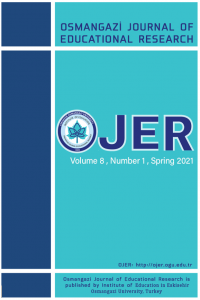A Study on the Effects of Ideologies on Education and Management in the Context of Basic Concepts of Political Philosophy
Abstract
Ideologies are intellectual wholes which comprise world views, desired future designs and the realization of these designs in life. Fascism, nationalism, conservatism, liberalism, social democracy, anarchism and socialism appear to be the most prevalent ideologies in terms of their effects on education. Main purpose of the study is to discuss the effects of different ideologies on education and its management in the context of the concepts of political science. For this purpose, it is aimed to determine what the certain political science concepts such as individual, state, sovereignty, secularism, civil society, bureaucracy, law, justice, equality and democracy mean according to different ideologies and how these concepts affect education and management. This study is a field study whose design is a document analysis. In the study, it is observed that fascism; nationalism and conservatism ideologies have some similar views on the issues of individual, state and sovereignty. Liberalism and social democracy, on the other hand, have very similar views on secularism, civil society, bureaucracy, law, justice, equality and democracy; yet have different opinions on the subjects of state and sovereignty. Socialism embraces the working-class state and classless society and emphasizes that freedom, democracy; law and inequality vary with classes. Fascism and conservatism highlight the preservation function of education and management. Liberalism and social democracy function as developer. While anarchism considers education as rather status quo and compulsive, socialists regard it as denominational and define it as a superstructure institution. It is suggested that quantitative and qualitative studies be performed on how the basic concepts are interpreted by students, teachers and academicians by studying the basic concepts with a deeper content in terms of different ideologies.
Supporting Institution
None
References
- Reich, W. (2014). Faşizmin kitle psikolojisi. (Y. Pazarkaya, Çev.). Cem Yayınevi.
- Sönmez V. (2020). Eğitim felsefesi. (16. baskı). Anı Yayıncılık.
- Sweezy, P. (2015). Sosyalizmin üzerine dört ders. (T. Öncel, Çev.). Yordam Kitap.
Abstract
References
- Reich, W. (2014). Faşizmin kitle psikolojisi. (Y. Pazarkaya, Çev.). Cem Yayınevi.
- Sönmez V. (2020). Eğitim felsefesi. (16. baskı). Anı Yayıncılık.
- Sweezy, P. (2015). Sosyalizmin üzerine dört ders. (T. Öncel, Çev.). Yordam Kitap.
Details
| Primary Language | English |
|---|---|
| Subjects | Other Fields of Education |
| Journal Section | Research Article |
| Authors | |
| Publication Date | June 23, 2021 |
| Published in Issue | Year 2021 Volume: 8 Issue: 1 |


